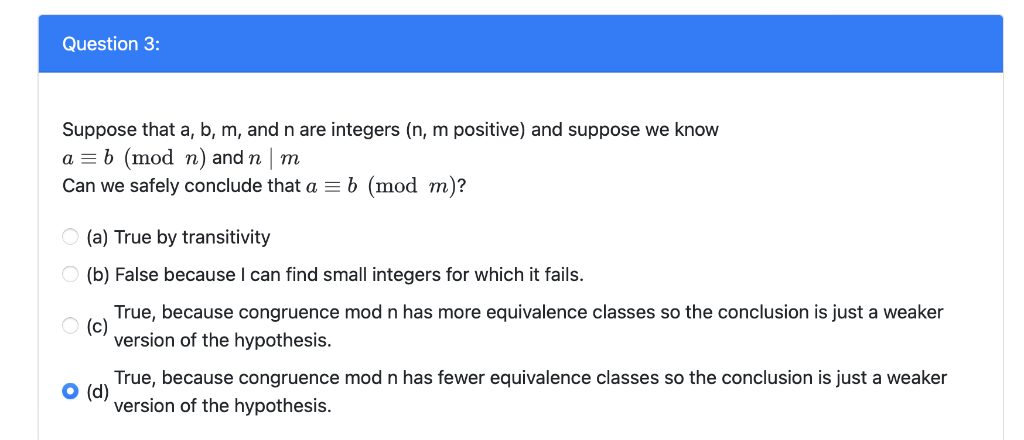Suppose that a, b, m, and n are integers (n, m positive) and suppose we know a = b (mod n) and n | m Can we safely conclude that a = b (mod m)? (a) True by transitivity (b) False because I can find small integers for which it fails. True, because congruence mod n has more equivalence classes so the conclusion is just a weaker (c) version of the hypothesis. True, because congruence mod n has fewer equivalence classes so the conclusion is just a weaker O (d) version of the hypothesis.
Suppose that a, b, m, and n are integers (n, m positive) and suppose we know a = b (mod n) and n | m Can we safely conclude that a = b (mod m)? (a) True by transitivity (b) False because I can find small integers for which it fails. True, because congruence mod n has more equivalence classes so the conclusion is just a weaker (c) version of the hypothesis. True, because congruence mod n has fewer equivalence classes so the conclusion is just a weaker O (d) version of the hypothesis.
Elements Of Modern Algebra
8th Edition
ISBN:9781285463230
Author:Gilbert, Linda, Jimmie
Publisher:Gilbert, Linda, Jimmie
Chapter2: The Integers
Section2.5: Congruence Of Integers
Problem 39E
Related questions
Question

Transcribed Image Text:Question 3:
Suppose that a, b, m, and n are integers (n, m positive) and suppose we know
a = b (mod n) and n | m
Can we safely conclude that a = b (mod m)?
O (a) True by transitivity
(b) False because I can find small integers for which it fails.
True, because congruence mod n has more equivalence classes so the conclusion is just a weaker
(c)
version of the hypothesis.
True, because congruence mod n has fewer equivalence classes so the conclusion is just a weaker
O (d)
version of the hypothesis.
Expert Solution
This question has been solved!
Explore an expertly crafted, step-by-step solution for a thorough understanding of key concepts.
This is a popular solution!
Trending now
This is a popular solution!
Step by step
Solved in 2 steps with 1 images

Recommended textbooks for you

Elements Of Modern Algebra
Algebra
ISBN:
9781285463230
Author:
Gilbert, Linda, Jimmie
Publisher:
Cengage Learning,

Elements Of Modern Algebra
Algebra
ISBN:
9781285463230
Author:
Gilbert, Linda, Jimmie
Publisher:
Cengage Learning,